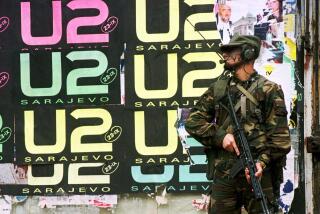BUILDING PEACE IN THE BALKANS : Presidential Visit Sparks Urgent Bid to Defuse Disputes
- Share via
SARAJEVO, Bosnia-Herzegovina — American and NATO officials, on the eve of a visit by President Clinton, crisscrossed the former Yugoslav federation on Friday in an urgent effort to put out multiple fires that endangered the U.S.-brokered Bosnia peace accord.
Bosnian Serbs came under intense international pressure to halt a destructive exodus from Serb-held Sarajevo suburbs on the eve of Clinton’s arrival in Bosnia today. Two Serbian leaders urged their people to remain at home for now, but it was not clear whether panicked residents would heed the call.
The Serbs are protesting the hand-over of their suburbs to Muslim-Croat government control under the peace plan, and some have begun to dig up their dead, hit the road and torch their empty houses.
Mediators also pressed Croatian and Muslim authorities in the divided southwestern city of Mostar, where ethnic tension could destroy the fragile Muslim-Croat federation, a pillar of the accord drafted in Dayton, Ohio.
Despite the diplomatic frenzy, Serbs around Sarajevo continued to pack up belongings and leave for territory in Bosnia that will remain under Serbian control. Many were dropping off their furniture and appliances and returning home to await news of their likely fates. U.N. officials say that up to 80% of the 70,000 Serbs in the area have removed at least some of their possessions.
On Friday, however, the overall pace of departures slowed.
Meanwhile, about 100 Russian troops joining the NATO-led peace mission arrived at the U.S.-controlled Tuzla air base in northeastern Bosnia. It is the first time since World War II that the former Cold War enemies will work together in a potential combat situation.
“This is a great day for this deployment,” said Maj. Gen. William L. Nash, commander of U.S. forces in Bosnia, who enthusiastically greeted the fur-hatted soldiers on the Tuzla tarmac. “It is a great day for the U.S. and a great day for Russia.”
“For the sake of peace in this territory,” responded Russian brigade commander Col. Alexander Lentsov, “I hope we will work hand in glove.”
The Russian deployment will eventually number 1,500 men and take its orders directly from U.S. commanders rather than NATO. As traditional allies of the Serbs, the Russians will be concentrated in the newly formed Republika Srpska, made up of the land seized by the Serbs in 3 1/2 years of war that is now recognized as a ministate within Bosnia-Herzegovina.
Most of Friday’s attention was focused on the whirlwind of last-minute attempts to prevent an embarrassing unraveling of the peace accord as Clinton reviews American troops stationed in and around Tuzla.
U.S. special envoy Robert Gallucci, in the midst of three days of meetings with Bosnian Muslim and Serb officials, abruptly added Mostar to his itinerary Friday. There he underscored to Muslim and Croatian authorities Washington’s insistence that the city be unified as envisioned in an 18-month, U.S.-sponsored peace pact that Croats, especially, have largely ignored.
Also making the high-level rounds through Sarajevo, Mostar, the Serbian capital of Belgrade or the Croatian capital of Zagreb were NATO Secretary-General Javier Solana and U.S. Army Gen. George A. Joulwan, NATO’s top military commander, while the civilian and military officials in charge of enforcing the Dayton agreement spent long hours with Bosnian Serb representatives.
Some Bosnian Serb officials have whipped up fears among Sarajevo Serbs who do not trust government by their former enemies. And the Muslim-led Sarajevo government has not done enough to adequately reassure these Serbs that they will be safe, diplomats say.
“It is very sad to us that the people of Serbian origin living in Sarajevo are not told clearly to stay,” Solana said in Sarajevo, after meeting with Bosnian Serb official Momcilo Krajisnik.
Solana, who later traveled to see the president of neighboring Serbia, Slobodan Milosevic, said he rejected Krajisnik’s demand that the transfer of Serb-held suburbs to government control be delayed by up to a year. Later, Krajisnik used Bosnian Serb radio to discourage Sarajevo Serbs from evacuating their homes.
“Moving of the Serbs would be a defeat for all of us,” he said on Bosnian Serb television.
Milosevic also threw his considerable weight behind the cause and issued a statement telling Bosnian Serbs that the Dayton accord guarantees their rights and there was “no reason” they should resort to the life of a refugee.
The transfer of the suburbs begins Jan. 19 and is to be completed by March 20, with the ultimate aim of reuniting this battered capital.
Some voices of moderation were beginning to emerge in one Serb-held suburb, Ilidza.
“We should stay here,” said Goran Kapor, an accountant before the war who works in a seed store and who has an infant son. “I am sure we’ll have problems. We fear retaliation; they will treat us badly. But we should stay to survive. It is not wise to give away territory that we defended for four years.”
Kapor said most of the people he knew will not flee Ilidza but will attempt to make a go of it and fight for their rights, unless it becomes clear that they are not safe.
But Slobodan Gluhovic, 60, was not going to wait. He loaded his wife and two grandchildren into his beat-up Yugo car, tied a sack full of hens to the roof and headed for the nearby Serbian stronghold of Pale.
“My parents were killed in World War II, and I cannot allow my grandchildren to become orphans,” he said, bursting into tears.
More to Read
Sign up for Essential California
The most important California stories and recommendations in your inbox every morning.
You may occasionally receive promotional content from the Los Angeles Times.











